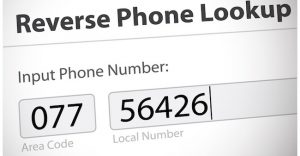People rarely use phone books but still need access to phone numbers. Most people use cell phones and don’t have an easy way to find numbers. You could lose your contact list or need to find the number of someone new; this is not an easy task. You might have found a phone number with no name next to it, which is just as frustrating. Online services offer information, but it’s rarely free. If a site claims that they offer a free search, you might be required to pay for the results.
Reasons to Search for a Number
There are many reasons people search for cell phone numbers. The person may have given you the number but you wrote it down wrong; the number got lost; there’s no name attached; your phone contacts got deleted or your phone was stolen; you may want to find a family member or old friend whose number has been changed.
Retrieving Phone Numbers
You’ve lost the contact list on your phone and need to retrieve the numbers. Users can check their phone accounts for backups, look through text messages or phone calls, or post the problem on social media. You might search cell phone numbers by the person’s name or wait for people to call you.
Name Search
There are several ways to do a search. You can search the person’s name. If it’s a common name, add as much information as possible to get accurate results. The search might show a list of people with the same name. You can choose the right person by the address, age, occupation or family members and associates.
Reverse Phone Search
You find a piece of paper with a phone number written on it but no name. Calling the number could be embarrassing if it’s a potential boss or date you’d rather forget. Use a search app or program that you’d use to search for a person by name. This time, type in the phone number you want to search. Cell phone numbers are harder to get since they change so often. Plus, some companies will charge for the search results.
Online Searches
You can find reliable services to look up a person’s cell phone number. Services that have free lookups include Zaba Search, Callersmart, and Kiwi Searches. Apps help people to search for phone numbers by name or through a phone number lookup app. If you use a premium paid search, you can check company reviews before buying the information. Some companies have free trials or discounts, so you don’t have to buy a full membership.
Search Engines
Google and Bing are the two most common search engines on the Internet. Users may get more information than they bargained for on these sites. The search engines may also repeat information. Try using an alternate search engine such as Yahoo or GoDuckGo to find less common information.
SpyDialer
SpyDialer is a popular reverse phone search website. The free service refers to itself as the “newest, fastest, SNEAKIEST free reverse phone number lookup on the web.” Users can search cell phone numbers, landlines, unpublished numbers and email addresses. The service also works with VoIP numbers, which are commonly used by scammers. The system is legal because it uses information available to the public, including social media sites like Facebook and LinkedIn, catfish websites, White Pages, traditional phone books, Yellow Pages, public records, search engines, and more. Users are limited to 25 searches per day.
Who Called Me?
Users find valuable information on the website Who Called Me? Along with phone numbers, it contains comments and warnings regarding common phone numbers.
Facebook is the largest social media outlet online. As such, finding a person’s information is easier there than on some other sites. There are several ways you can find a person’s contact data through Facebook.
- Using the person’s name. Search the person’s name from the main search bar.
- Use the reverse phone search tool.
- Search by location.
- Use a person’s school or employer for contact data on the organization’s website. The person may also be affiliated with the organization.
- Friends of friends. If you have mutual friends, check the friends list of a person you both know.
- Public groups. You can search public groups for a common link.
Search by Username
Some people may not use their real identities on social media websites, which makes it harder to find information. However, if you know a person’s common username, you may be able to use it to locate the person’s cell number or other information. For example, you want to find the cell number or other information for your friend John Smith. The name is common and the likelihood of finding the right person is very small. If you know John Smith uses the name FirefighterDad37, searching for his information became much easier. Using a search engine or people search app, type in the username and sort through the results until you find the right person.
Smartphone Apps
Users can do searches on their devices or use their Android or iPhones. The Apple store and Google Play offer many third party apps to help make searches easier.
TMI?
Savvy people get access to our personal information every day. People want to everything about us. Search engines are able to give out a great deal of personal information including work history, education, social media profiles, criminal and arrest records, bankruptcy and court information.
Sensitive Information
Although almost anyone can access our sensitive information, many sites require you to sign a statement saying you won’t use the information against a person, especially in business. It’s illegal to use search information to deny someone a job. While searching for a phone number may seem harmless, we have to take steps to protect the rest of our information. Hackers and scammers are ruthless when it comes to stealing identities and gaining access to our accounts.


